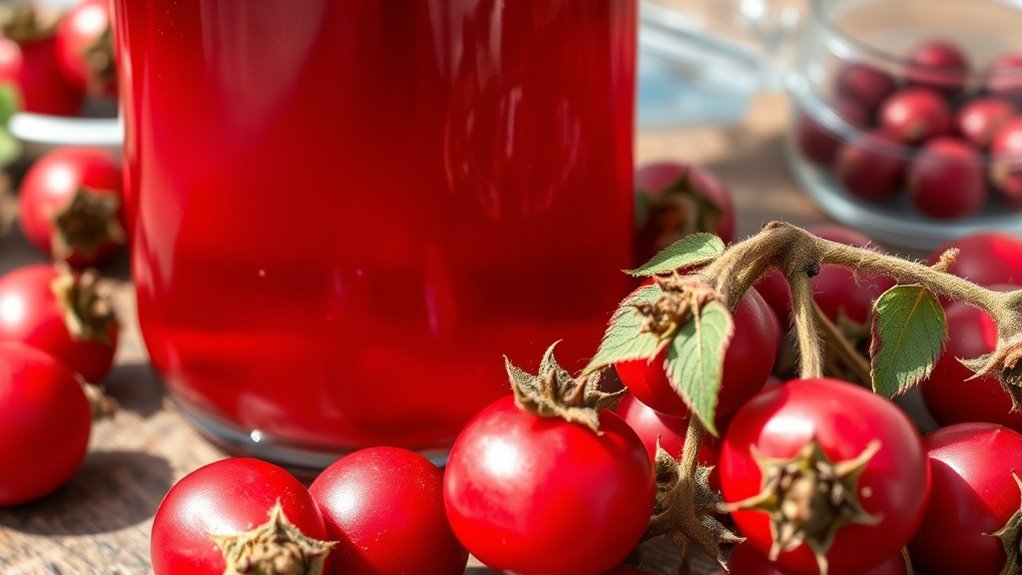To maximize vitamin C and extend your rosehip syrup’s shelf life, harvest ripe, firm rosehips after the first frost, using sharp tools. Store them in breathable containers in a cool, dry place or freeze for long-term use, avoiding direct sunlight and moisture. Proper cleaning and gentle handling help preserve nutrients, while sustainable harvesting supports the plant’s future. Keep in mind that careful storage techniques are key—learn more to keep your syrup fresh and nutrient-rich longer.
Key Takeaways
- Proper harvesting after frost preserves vitamin C and enhances flavor in rosehip syrup.
- Store rosehips in breathable containers away from sunlight to maintain nutrient content and prevent spoilage.
- Gentle washing and drying before processing help retain vitamin C and extend shelf life.
- Using airtight containers and refrigeration or freezing prolongs syrup’s freshness and nutrient retention.
- Minimizing heat exposure during processing helps preserve vitamin C and ensures longer shelf life.

Rosehip syrup is a natural and flavorful way to boost your health, packed with vitamin C and antioxidants. When you’re ready to make your own or source high-quality syrup, understanding how to properly harvest and store your rosehips becomes essential. Your journey to wellness starts with the right techniques to gather these vibrant fruits, ensuring you retain their potent nutrients and flavor. Harvesting techniques are straightforward but demand attention. You want to pick ripe rosehips—those that are bright red or orange and feel firm to the touch. Avoid any that are shriveled or discolored, as they might have lost some of their nutritional value. The best time to harvest is after the first frost, which naturally sweetens the fruit and enhances flavor. Using sharp scissors or pruning shears, snip the stems just below the fruit, taking care not to damage the plant or other ripening rosehips. Be gentle but efficient, collecting only the best specimens for your syrup. Once harvested, proper storage conditions are vital to preserve the vitamin C content and prevent spoilage. Keep the rosehips in a breathable container—like a woven basket or paper bag—away from direct sunlight and excessive moisture. If you’re not planning to process them immediately, refrigerate the rosehips to slow down degradation. For longer storage, you can freeze them in airtight containers, which preserves their nutritional profile until you’re ready to make your syrup. When you’re prepared to turn your harvest into a delicious syrup, ensure your rosehips are thoroughly washed to remove dirt and insects. Dry them gently to prevent mold. This step also helps you ascertain the quality of your harvest before processing. The key to maintaining the high vitamin C content is to handle the fruit carefully and minimize exposure to heat and light during storage and processing. Additionally, choosing sustainable harvesting practices can help protect the environment and ensure the longevity of wild rosehip populations. The right harvesting techniques combined with ideal storage conditions mean your rosehip syrup will be rich in nutrients, flavorful, and shelf-stable. You’re taking control of your health, choosing to embrace natural remedies that empower you to nourish your body on your terms. By respecting the plant’s natural cycle and storing your harvest properly, you guarantee every drop of your homemade syrup delivers maximum benefits. This knowledge liberates you from reliance on processed supplements or store-bought products, giving you confidence in the purity and potency of your homemade remedy. Harvest wisely, store carefully, and enjoy the vibrant health benefits that come from your own sustainable, nutrient-rich rosehip syrup.
Frequently Asked Questions
How Is Rosehip Syrup Typically Used in Recipes?
You can incorporate rosehip syrup into your cooking applications by drizzling it over pancakes, yogurt, or oatmeal for a tangy sweetness. It also pairs beautifully with citrus or berry flavors in smoothies, dressings, or desserts. Feel free to experiment and add a splash to cocktails or teas, giving your recipes a vibrant, fruity twist. Embrace the versatility and let your culinary creativity run free with this naturally flavorful ingredient.
Are There Any Common Allergies Associated With Rosehip Syrup?
While rosehip syrup offers vibrant health benefits, it’s wise to be aware of potential allergenic reactions. Some individuals might experience sensitivities, especially if they have allergies to plants in the Rosaceae family, due to cross reactivity. If you’ve had allergic responses before, start with a small amount to test your tolerance. Embrace your wellness journey with confidence, knowing that awareness helps you enjoy this natural remedy safely and freely.
Can Homemade Rosehip Syrup Be Stored Without Refrigeration?
You can store homemade rosehip syrup without refrigeration if you use proper storage methods, like airtight bottles and keeping it in a cool, dark place. This extends its shelf life, but it’s best to consume within a few weeks to ensure freshness and safety. Regularly check for signs of spoilage, such as mold or bad smell, and always trust your senses to determine if it’s still good.
What Are the Signs of Spoilage in Rosehip Syrup?
If your rosehip syrup develops a foul smell, mold, or a cloudy appearance, it’s a sign of spoilage caused by microbial contamination. The botanical properties that once preserved it now fail, revealing fermentation or decay. You’re free to discard it when these signs appear, trusting your senses over expiration dates. This way, you reclaim control and protect your health, embracing fresh, vibrant flavors over compromised leftovers.
Is Rosehip Syrup Suitable for People With Diabetes?
You should be cautious with rosehip syrup if you have diabetes, as it can impact your diabetic blood sugar levels. Check the sugar content considerations carefully because some brands contain added sugars that may spike your blood sugar. Look for unsweetened or low-sugar options to enjoy its benefits without compromising your health. Always consult your healthcare provider to ensure it fits your diabetes management plan and helps you feel liberated.
Conclusion
Now that you know rosehip syrup is packed with vitamin C, you’re all set to enjoy its health benefits. Remember, proper storage can extend its shelf life by up to six months, ensuring you get the most out of every batch. Did you know that a single tablespoon of rosehip syrup can provide over 50% of your daily vitamin C needs? So, store it well, and boost your immunity naturally with this delicious, nutritious syrup.










